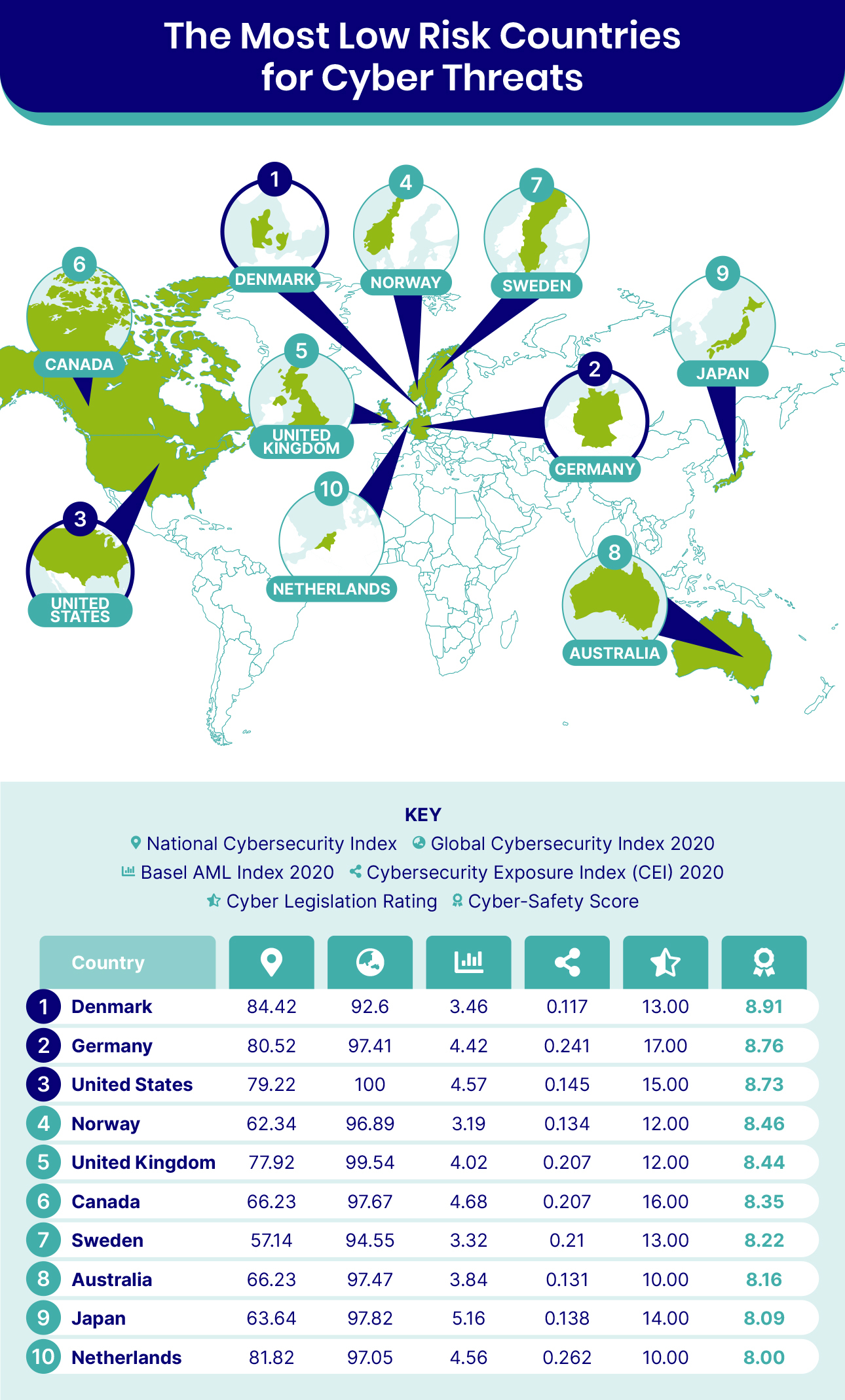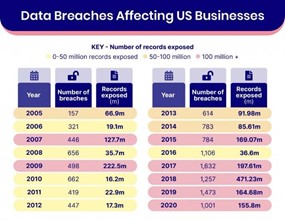U.S. Ranks Third Best in New Global Cybercrime Report
The AI-powered anti-fraud brand SEON has released new information about the countries that are most and least at risk of cyberattacks, with the U.S. taking up the third best spot in the world.
Dubbed the Global Cybercrime Report, the report from SEON points to Denmark as the safest country in the world from fraud and other cybercrime. Next is Germany, followed by the USA.
The three nations that ranked at the bottom of the table of 94 countries, which was released in late October, were – starting from the worst performer – Myanmar, Cambodia and Honduras.

Image credit: SEON
U.S. Performance
According to the Global Cybercrime Report, the United States reached the prominent third-best position with a Cyber-Safety Score of 8.73. This was the result of strong legislation, low cybersecurity exposure (how exposed the digital infrastructure is) and the exceptional top score at the Global Cybersecurity Index, one of the six indices taken into account in the calculation of Cyber-Safety Scores.
In simpler terms, this means that Americans enjoy the third best cybercrime landscape in the world, with individuals, companies and public infrastructure all being fairly well protected through both legislation and technology at their disposal.
However, the report makes it clear that online fraud and cybercrime are still very widespread, even in these top ranking countries. Specifically, according to released numbers, 241,342 people complained about phishing and pharming attacks against them in 2020 in the USA alone. This makes up a total of 32.96% of all complaints filed to the Internet Crime Complaints Center (IC3). Also prominent are non-payment and/or non-delivery at 14.87%, and digital-enabled extortion at 10.48% of all complaints. These top issues make up 58.31% of all complaints within 2020 – and certainly three areas of improvement if the country is to reach an even better position next year.
Fraud and Data Breaches Remain Key Concerns for Business Leaders
A third area of focus for the report is how online crime affects businesses in the U.S. Per the data, an average of 206,000 web attacks target ecommerce retailers every single month. These can be anything from scams to hacking attempts as well as several different types of fraud. Fraud in particular has been calculated to cost the global economy approximately $5.1 trillion every year, with experts expecting this astronomical figure to rise further.
Moreover, data leaks are another serious issue in the country, which reports hundreds of millions of records exposed every year. However, it should be taken into account that thorough monitoring and reporting of data breaches helps drive this figure up compared to other countries – and this transparency is in fact one of the reasons why the U.S. performs so well compared to its regional and international peers.
Nevertheless, 155.8 million records were exposed in 2020. This is a slight decrease from 2019, yet a steadily high number. Although there is not always a year-on-year increase in data leaks, as the table below shows, the overall trends are staggering. For instance, the number of data breaches rose by more than 537% from 2005 to 2020 while in seven of the past 15 years, more than 100 million records were exposed – and five of those were in the past six years.

Image credit: SEON
The Global Cyber-Safety Landscape
To calculate the Cyber-Safety score for each country, SEON conducted meta-analysis, taking into account data from the six most reputable cybersecurity indexes and assigning certain weight to each. These examine key issues that affect a country’s capacity to prevent, monitor and mitigate cybercrime and digital fraud, as well as the overall cybersecurity landscape, including regional and government strategies, and legislation in place locally – which means that several diverse considerations were taken into account such as anti-money laundering, terrorist financing, identity theft, account takeovers, bot activity, friendly fraud, ransomware attacks, data leaks and carding.
The objective was to calculate a single score per country that accurately represents the entire safety landscape for its residents, organizations and institutions, answering questions about which nations are faring well, on the right path or urgently need to step up their game.
The worst performers lack legislation against cybercrime and their governments and businesses generally lack adequate safeguards in place against online scammers, hackers and fraudsters. Myanmar, for example, is noted as having almost nothing in place in terms of legislation, although this may change soon with the Electronic Transactions Law, per a legal breakdown on Lexology.
However, the researchers warn against complacency even for the top-scoring countries, noting the overall rising trends of cybercrime globally and the ever-evolving methods utilized by criminals and fraudsters – who keep diversifying their arsenal and strategies to target even more victims in new ways.
Overall, there are some surprises in the Global Cybercrime Report, with certain countries faring better or worse than one would have expected from their overall technological and commercial prowess.
A few key countries and their position on the rankings are:[1]
Top scores
- Denmark
- Germany
- USA
- Norway
- UK
- Canada
Good scores
8. Australia
9. Japan
13. New Zealand
14. Israel
18. France
21. Switzerland
Middle of the road
35. Brazil
38. Italy
50. Argentina
53. Colombia
59. Mexico
61. India
62. Saudi Arabia
Worst performers
82. Pakistan
83. Panama
84. Venezuela
89. Algeria
92. Honduras
93. Cambodia
94. Myanmar

